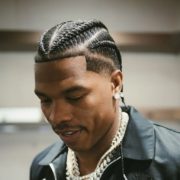How Lil Baby Overcame a $100M Tax Wake-Up Call
Atlanta-born rap superstar Lil Baby has built a wildly successful career with platinum records, sold-out tours, and brand deals that have earned him over $100 million. But as he recently revealed in a candid interview, his meteoric rise came with a major oversight: he had no idea he needed to pay taxes during the first two years of his career.
Appearing on the A Safe Place Podcast hosted by fellow rapper Yachty, Lil Baby shared an unfiltered look into the financial realities behind the glitz and glam of hip-hop stardom — and how early ignorance nearly cost him everything.
Fame Came Fast, But So Did Financial Confusion
Lil Baby burst onto the scene in 2018 with his debut album under Quality Control Music, delivering instant hits like “Drip Too Hard” and “We Paid.” With massive success came massive checks — tens of millions from labels, endorsements, and touring. But as Lil Baby explained, no one ever taught him what to do with that money — especially when it came to taxes.
“I done got over $100 million from labels and deals. Not one time nobody still haven’t told me how to pay my taxes,” he said. “Nobody even never told me pay my taxes.”
Despite hearing about celebrities being crushed by tax debt, Lil Baby admitted he didn’t truly understand how tax liability worked. Like many self-made stars with no formal financial education, he assumed saving money was the smartest play. But ironically, the more money he saved, the more he owed.
Hustler Mentality Meets IRS Reality
“I was doing it so wrong, my first tax bills was so high ’cause I was on some hustling sh-t like saving all my money,” he said. “I didn’t even know you need to be spending this money — you need to be spending it the right way. So you can save it on your taxes.”
The rapper’s mindset — stack every dollar, hold onto every cent — made sense in the streets. But in the world of federal income taxes, it created massive problems.
He learned the hard way that unspent, undeclared income in a high-earning bracket draws major attention from the IRS. Without proper deductions, write-offs, or professional help, Lil Baby found himself facing a huge tax bill, one that threatened to undermine his financial progress.
No Blueprint, No Advisors
Lil Baby’s admission exposes a larger issue within the entertainment industry — especially for young artists from disadvantaged backgrounds: no financial education, no guidance, and no system for support.
“This is a while ago, whenever I started rapping,” he clarified. “I always knew from being around that people have tax problems… but I didn’t know how to avoid it.”
Despite being surrounded by industry professionals, no one pulled him aside to explain taxes, set up financial management systems, or advise him on investments. His early success came without a financial blueprint — a risk that many new artists unknowingly face.
Regret and Reflection: The Price of Dropping Out
Lil Baby also opened up about one of his biggest regrets: dropping out of high school. He left Booker T. Washington High School early, a decision that, in hindsight, may have left him ill-prepared for the real-world responsibilities that came with fame.
“If I would’ve stayed in school, I might’ve learned some of this,” he admitted.
His reflection is a powerful message to young fans — that education matters, even if you’re chasing dreams in music, sports, or entrepreneurship. Real-life skills like financial literacy, taxes, and business management aren’t just optional — they’re critical.
Leveling Up: How Lil Baby Fixed His Money Game
Fortunately, Lil Baby didn’t let his early missteps define him. Today, he’s far more financially savvy. He now pays taxes quarterly, has a team of accountants, and has developed a sharper understanding of how to manage wealth.
His secret? Asking for help.
“I reached out to Rick Ross, 21 Savage, and some others,” he said. “That’s how I found my team.”
By surrounding himself with financially smart peers and learning from their strategies, Lil Baby is turning things around. From knowing nothing about taxes to managing millions responsibly, his story is a testament to growth, humility, and the power of mentorship.
A Lesson for the Culture
Lil Baby’s journey offers a cautionary tale and an inspiring lesson for rising stars, creatives, and hustlers alike: Making money is just step one. Managing it is everything.
His openness about financial pitfalls shatters the myth that success means having it all figured out. Many artists come into the game unprepared for what happens after the big checks start rolling in. And while label contracts, managers, and agents are often quick to collect their share, few invest in financial education for the talent.
That needs to change — and Lil Baby’s voice might just help start the movement.
The Bottom Line
From a teenage dropout in Atlanta to a $100 million mogul, Lil Baby’s story is one of transformation. He didn’t let ignorance break him. Instead, he got educated, got help, and now serves as a real-world example of growth in the face of high-stakes mistakes.
Whether you’re a fan, a fellow artist, or just someone working toward your own version of success, there’s a powerful takeaway here:
“It’s not just about making money — it’s about learning how to keep it.”
Make money playing video games!:
Read more Urban news











